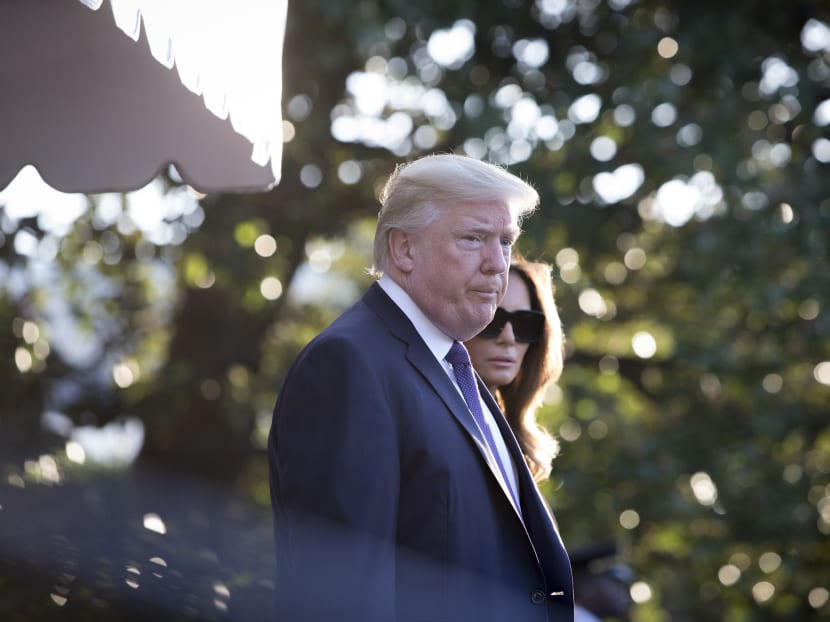Trump to force Congress to act on Iran accord
WASHINGTON — United States President Donald Trump is expected to overrule his top national security advisers and decline to certify the Iran nuclear agreement, according to people who have been briefed on the matter, a decision that would reopen a volatile political debate on Iran but is likely to leave in place the landmark deal negotiated by the Barack Obama administration.
WASHINGTON — United States President Donald Trump is expected to overrule his top national security advisers and decline to certify the Iran nuclear agreement, according to people who have been briefed on the matter, a decision that would reopen a volatile political debate on Iran but is likely to leave in place the landmark deal negotiated by the Barack Obama administration.
By declining to certify Iran’s compliance, Mr Trump would essentially kick it to Congress to decide whether to re-impose punitive economic sanctions. Even among Republicans, there appears to be little appetite to do that, at least for now.
Still, Mr Trump’s expected move would allow him to tell supporters that he had disavowed the accord, while bowing to the reality that the US would isolate itself from its allies if it sabotaged a deal with which Iran is viewed as complying. Mr Trump repeatedly ridiculed the deal during the 2016 presidential campaign, vowing to rip it up.
White House officials cautioned that the president had not yet formally decided to “decertify” the agreement. But he faces an Oct 15 deadline, and he has made little secret of his intentions, most recently when he declared at the United Nations two weeks ago that the agreement was “embarrassing to the United States”.
Mr Trump will present his decision on the deal as part of a broader American strategy to crack down on Iran for its ballistic missile programme and destabilising actions throughout the Middle East. Administration officials said he had signed off on the overall approach and hoped he would present it before Oct 15 deadline.
The strategy is an effort by the Trump administration to make the nuclear agreement only part of a multi-dimensional approach to pressure Iran on many fronts, including its missile programme, its support for militant groups like Hezbollah, and its intervention in the Syrian civil war on behalf of the Assad government.
But the administration has yet to articulate that broader strategy. As a result, the nuclear deal remains the fulcrum of the relationship with Iran – and a political football in Washington.
Congress will have to decide whether to re-impose sanctions, which could sink the deal, or use the prospect of that to force Iran – and the other parties to the deal – back to the negotiating table to make changes in the agreement.
Democrats argue that Mr Trump should certify the agreement, warning that the administration’s ability to press Iran on other activities it objects to would be compromised – rather than enhanced – if the United States threw the future of the agreement into question.
Britain, France and Germany, all signatories to the agreement, are watching Mr Trump’s deliberations with deepening concern. Diplomats from the three countries, as well as from the European Union, met with dozens of senators this week to warn them that if the United States withdrew, Europe would not follow.
“For us, this is a high priority in our national security,” said Mr Peter Wittig, Germany’s ambassador to Washington. “We will stand by the Iran deal, and we want you not to walk away, but to comply with it. We share some of the grievances you have about Iran, and we can talk about it – and we should talk about it – but only on the basis of sticking to the deal.”
The deal is also contentious inside the administration. Secretary of State Rex W. Tillerson and Defence Secretary James Mattis have both urged Mr Trump not to back out of it, in part because that would free Iran to begin producing uranium and reprocessing plutonium immediately, not after 13 years, as is stipulated in the agreement.
But Mr Trump, after twice certifying the deal, has warned his aides that he would not do so again. As a result, the administration is looking for ways to claim Iran is in violation of the “spirit” of the accord, even if it has complied with inspection criteria.
The International Atomic Energy Agency has said that Iran was in compliance; when it has found minor violations, they have been quickly fixed.
The president could also decline to certify it by claiming that the deal is simply not in the national security interests of the United States.
Declining to recertify Iran’s compliance would amount to a compromise. Because it is simply a notification from the White House to Congress, it has no legal effect by itself. Trump could tell his supporters that he broke with President Obama on the deal, without actually violating its terms.
“It appears to be part of a ‘have your cake and eat it too’ strategy by the administration,” said Mr Philip H. Gordon, who coordinated Middle East policy in the National Security Council during the Obama administration.
The risk, Mr Gordon said, is that “while the administration may hope Congress refrains from passing new sanctions that cause the nuclear deal to collapse, no one can guarantee that outcome”. He noted that every Republican member of Congress voted against the deal.
The larger question is whether Mr Trump’s “decertification” would gradually strangle the bigger goals of the nuclear negotiation: To integrate Iran with Western economies while assuring it cannot build a nuclear weapon for more than a decade. THE NEW YORK TIMES







